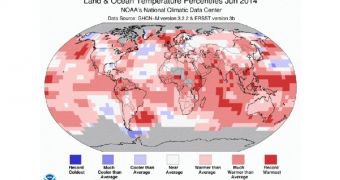A report shared with the public by the National Oceanic and Atmospheric Administration in the US (NOAA, for short) says that this year's June turned out to be the hottest since record keeping began decades ago, in 1880.
As if this weren't enough to really make folks freak out about climate change and global warming, it looks like last month was also the 38th consecutive June when temperatures well above the 20th century average were reported.
Besides, this past June was the 352nd consecutive month when the temperatures documented on a global scale added up to an average exceeding world temperatures in the 20th century, NOAA specialists say.
As detailed in a press release on the Administration's official website, “The globally averaged temperature over land and ocean surfaces for June 2014 was the highest for June since record keeping began in 1880.”
“It also marked the 38th consecutive June and 352nd consecutive month with a global temperature above the 20th century average. The last below-average global temperature for June was in 1976 and the last below-average global temperature for any month was February 1985.”
In this year's June, the combined average for land and ocean surface temperatures was one of 61.20 degrees Fahrenheit (16.22 degrees Celsius), i.e. 1.30 degrees Fahrenheit (0.72 degrees Celsius) over the 20th century average.
Thus, the June global land temperature exceeded the 20th century average by 1.71 degrees Fahrenheit (0.95 degrees Celsius). The ocean average temperature documented in the 20th century was surpassed by 1.15 degrees Fahrenheit (0.64 degrees Celsius).
As detailed by Science Daily, this increase in global average temperatures was recorded despite the fact that several regions across the world experienced a rather peculiar drop in local temperatures. Thus, some areas were much cooler than expected for this time of the year.
According to the NOAA researchers behind this latest report concerning changes in global weather patterns, the regions that cooled to a considerable extent this past June were a few areas in North America, Far East Russia, and small parts of central and northeastern Europe.
The regions that experienced record warmth last months were as follows: part of southeastern Greenland, parts of northern South America, areas in eastern and central Africa, sections of southern and southeastern Asia, and certain areas in every major ocean basin.
Scientists warn that, unless measures to curb greenhouse gas emissions and limit climate change are implemented without delay, chances are that the world as we know it will continue to warm in the years to come. This will affect both natural ecosystems and human society.

 14 DAY TRIAL //
14 DAY TRIAL //